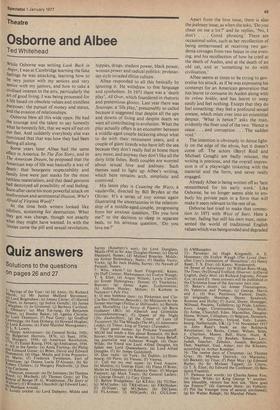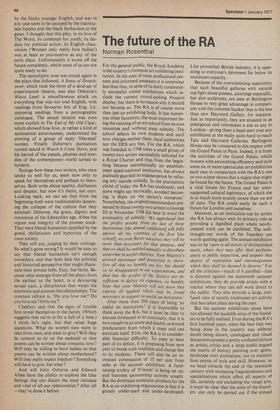Osborne and Albee
Ted Whitehead
While Osborne was writing Look Back in Anger, I was at Cambridge learning the fake feelings he was attacking, learning how to be very junior with my seniors and very senior with my juniors, and how to take a civilised interest in the arts, particularly the art of good living. I was being processed for a life based on obsolete values and mindless Purposes: the pursuit of money and status, and the evasion of relationships.
Osborne blew all this wide open. He had the courage and the talent to say honestly What he honestly felt, that we were all out on our feet. And suddenly everybody else was convinced that that was how they had been feeling all along.
Some years later Albee had the same effect in America. In The Zoo Story, and in The American Dream, he proposed that the American way of life was basically a way of death: that bourgeois respectability and family love were just masks for the most ruthless materialism, and that dead gestures had destroyed all possibility of real feeling. Soon after came his most powerful attack on conformism and sentimental illusion, Who's Afraid of Virginia Woolf?
At the time both writers looked like nihilists, screaming for destruction. What they got was change, though not exactly .vliat they might have wanted. In with the sixties came the pill and sexual revolution, hippies, drugs, student power, black power, woman power and radical politics: proletarian style invaded elitist culture.
Albee responded to all this basically by ignoring it. He withdrew to fine language and symbolism. In 1971 there was a 'death play', All Over, which foundered in rhetoric and pretentious gloom. Last year there was Seascape, a 'life play,' presumably so called because it suggested that despite all the ups and downs of living and despite death we were all contributing to evolution. What the play actually offers is an encounter between a middle-aged couple bickering about what to do with their retirement years, and a couple of giant lizards who have left the sea because they don't really feel at home there any more, and anyway they don't like all the dirty little fishes. Both couples are worried about sexual love and jealousy. Such themes used to light up Albee's writing, which here remains arch, simplistic and contrived.
His latest play is Counting the Ways, a vaudeville, directed by Bill Bryden at the Olivier. It's a series of tiny scenes again illustrating the uncertainties in the relationship of a middle-aged couple, progressing from her anxious question, `Do you love me?' to the decision to sleep in separate beds, to his anxious question, 'Do you love me?' Apart from the love issue, there is also the jealousy issue, as when she asks, 'Do you cheat on me a lot ?' and he replies, 'No, I don't . . . Good phrasing.' There are occasional solos, such as her recollection of being embarrassed at receiving two gardenia corsages from two beaux in one evening, and his recollection of how he cried at the death of Auden, and at the death of an old cat, and at 'something to do with civilisation.'
Albee seems at times to be trying to generalise his attack, as if he was expressing his contempt for an American generation that has learnt to consume its Auden along with its creme bailee, and has learnt to weep easily 'and feel nothing. Except that they do feel something: they feel a profound sexual unease, which mists over into an existential despair. 'What is hence?' asks the man, evidently the finer soul of the two. 'Hence is cease . . . and corruption . . . The sudden void.'
The intention is obviously to dance lightly on the edge of the abyss, but it doesn't come off. The actors (Beryl Reid and Michael Gough) are badly miscast, the writing is precious, and the overall impression is of a playwright tinkering with the material and the form, and never really engaged.
Already Albee is being written off as 'best remembered for his early work.' Like Osborne, he no longer seems able to embody his private pain in a form that will make it seem relevant to the rest of us.
Osborne last tried to make that connection in 1971 with West of Suez. Here a writer, fading but still his own man, represented the world of traditional English values which was being eroded and degraded by the bitchy younger English, and was in any case soon to be usurped by the inarticulate hippies and the black barbarians at the gates. I thought that this play, in its love of The Word, its contempt for youth, its disdain for political action, its English chauvinism (`Women only really love bullies') was at least as provocative as any of the early plays. Unfortunately it wrote off the future completely, which most of us are not quite ready to do.
The apocalyptic note was struck again in the plays that followed. A Sense of Detachment, which took the form of a send-up of experimental theatre, was also Osborne's Waste Land: a miscellaneous attack on everything that was not trad English, with readings from favourite bits of Eng. Lit. opposing readings from a pornographic catalogue. The sexual tension was even more explicit in The End of Me Old Cigar, which showed how love, or rather a kind of sentimental amorousness, undermined the plotting of a group of nasty 'liberated' women. Finally Osborne's puritanism turned rancid in Watch It Come Down, and his hatred of the pseuds, phonies and trendies of the contemporary world turned to hysteria.
Strange how these two writers, who once spoke so well for us, seem now only to speak for themselves and perhaps to themselves. Both write about apathy, disillusion and despair, but now it's theirs, not ours. Looking back, we can see that from the beginning both were traditionalists lamenting the collapse of the culture that they Admired: Osborne, the grace, dignity and innocence of the Edwardian age, Albee the vigour and integrity of the pioneer stock. They were liberal humanists appalled by the greed, philistinism and hypocrisy of the mass society.
They still are, judging by their writings. So what's gone wrong? It would be easy to say that liberal humanism isn't enough nowadays, and that both lack the political and historical perspective that might illuminate their private hells. Easy, but facile. Because what emerges from all the plays, from the earliest to the latest, is a devouring sexual pain, a disturbance that warps the emotions and poisons the relationships. The constant refrain is, 'Do you love me? Do you love me ? Only me?'
Chekhov said that the signs of trouble first reveal themselves in the family. (Which suggests that we're in for a hell of a time.) I think he's right, but that raises huge questions. What do women now want to take from men, and what to give? Will they be content to sit on the pedestal so that poems can be written about romantic love? Will they be willing to have babies so that poems can be written about motherhood ? Will they really expect freedom ? Something will have to give, but what ?
And will John Osborne and Edward Albee have the ability to explore the fake feelings that can distort the most intimate and vital of all our relationships? After all —they've done it before.























































 Previous page
Previous page